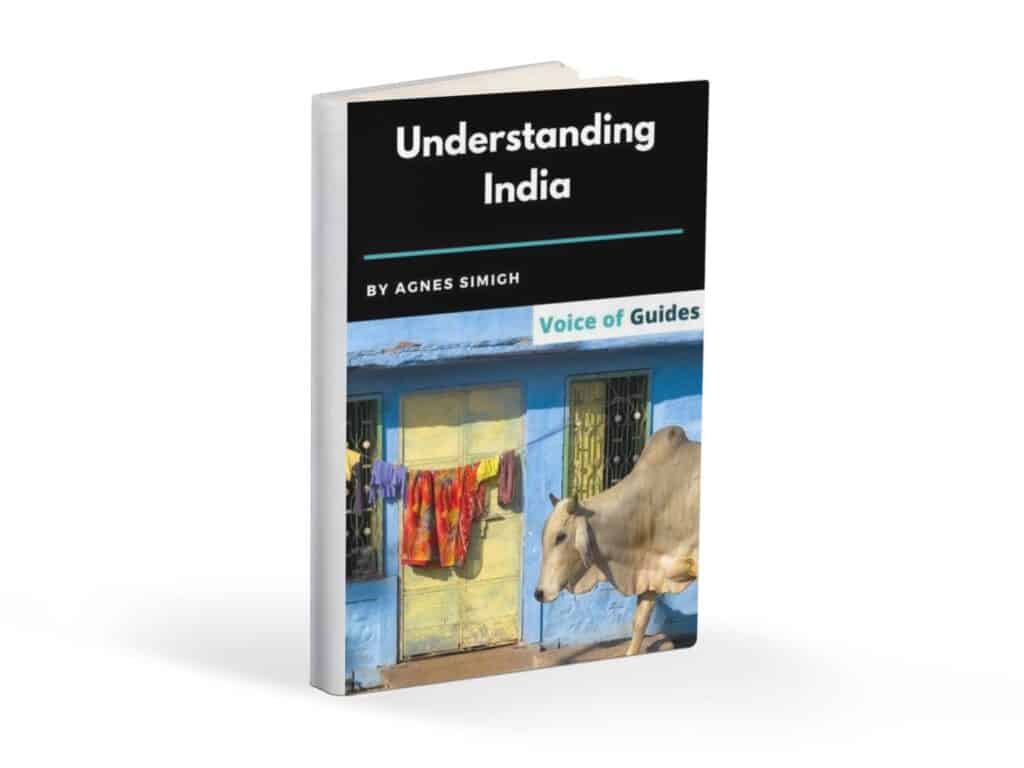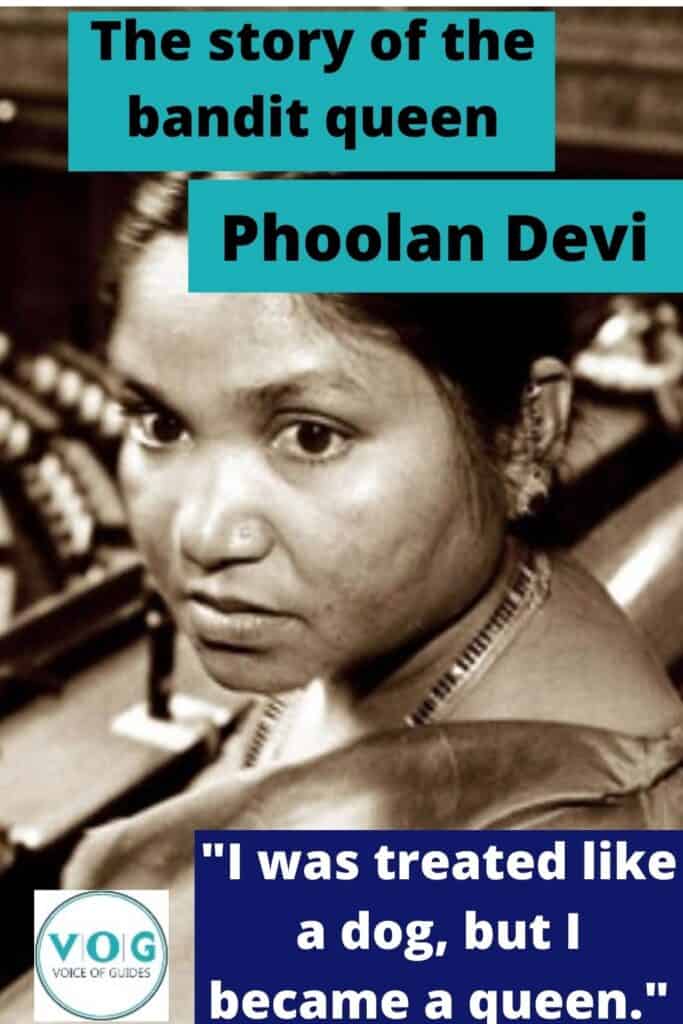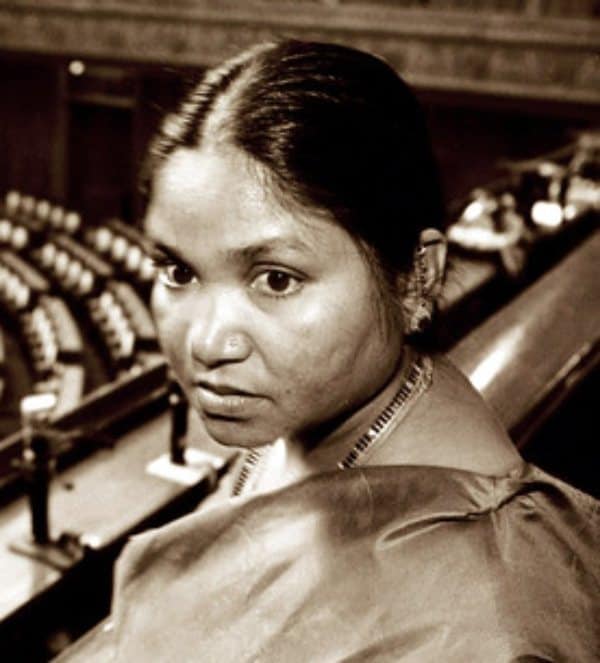“I was treated like a dog, but I became a queen.”
Phoolan Devi was married at the age of solely eleven when she had little idea what it meant. She was just needed as a maid for the house, nothing else. She was beaten, molested by her husband and many others for being just a “trashy Mallah” (belongs to the lowest of the four Indian castes), and as such, she was destined to be a whore. She becomes a bandit, learns how to handle a weapon, and makes a list of all those who have dishonored her (like Arya in Game of Thrones). The desire for revenge consumes her totally, and she starts to kill her enemies with her own hands. In the end, she had no choice but to surrender. This is not just her story. It is a mirror to the lower Indian society at that time.
The caste in which somebody is born is still very important in India. Let alone back in the 1970s, in the rural village of Gorha Ka Purwa, on the banks of the holy river Yamuna. Thakurs and Mallahs lived mixed. Thakurs belong to the second caste and Mallahs to the lowest caste of Sudras. The Thakurs are generally wealthy landowners, while the Mallahs live in great poverty on the riverbanks. They worked for their landlords, went to the river to collect water, and endured constant humiliations. If the landlord refused to pay for the work done, the Mallahs could not do anything about it. This is generally accepted, and this is what the Sudras are destined to endure. They must have each other’s backs if somebody from the upper caste feels like hitting them or let themselves be raped.
Click here to read more interesting facts about India
Phoolan Devi enters marriage as a child
Phoolan, born as a girl, was considered a financial burden to the family, who had to provide the dowry once it came to her marriage. She was different from other Mallahs. She had a big mouth since she was a little girl and stood up for the truth when she was hurt.
She was only an 11-year-old child when she became a wife.
In such cases, girls are supposed to stay in the parental house until they reach a mature age. However, Phoolan’s ill-famed husband, Putti Lal (35 years old at that time), took the girl with himself because he needed someone to do the housework. He had no respect for her young age and raped and tortured her continuously.

He whipped her, beat her up, and starved her out daily. She was in such bad shape that she lost most of her hair. However, no one really dared to stand up for her. According to Indian tradition, a wife is considered the property of her husband.
However, the news started to spread about her husband’s brutality, and despite the shame it posed, her family took her back home. At least until she got better. The mother fed her and treated her wounds. She was sent back to her husband as soon as she became stronger. According to the Indian customs, Phoolan was already “unclean”, and staying with the family as a married woman is shameful. Many children in similar situations set themselves on fire, jumped into a river or a well to escape the shame.
But nothing changed. So Phoolan was taken home again and was now stigmatized for the rest of her life. The villagers kicked and humiliated her, did not let her go to the well for water and raped her as they wished. She was even raped in her own house, with her parents witnessing that. When she made a report to the police, she was jailed and abused there too.
In the eyes of the Thakurs, she was a “worthless Mallah” who is to be used like a whore.
Anger and a desire for revenge tore her apart, and the little girl was on her way to be a cruel warrior. Now she was the one to threaten the others. She reached a point when she was ready to kill. Village people started to dread Phoolan Devi.
Phoolan Devi becomes a bandit
One day dacoits (bandits) came to their house and took Phoolan Devi with them. From then on, she also became one of the bandits. She no longer had a home, went from village to village to plunder, then hid in the jungle. The gang looted wealthy traders and demanded a ransom after their abduction. Then they gave most of the booty to the poor. She married one of the gang leaders, who was also a Mallah. For the first time in her life, someone was truly affectionate with her.
“Now he will show you what is love.” – The gang members told her before the wedding.
“Is love something you can eat?” Phoolan asked naively, having never been treated as a human being.
As a bandit, she once got back to the village of her ex-husband, Putti Lal, where she murdered him with her own hands. She cut off his limbs one by one, starting with his “snake,” then continuing with his hands and legs. The villagers were grateful to her and shouted:
“Long live Phoolan Devi!”
Her second husband lost his life in a gang war. For the rest of her life, she was determined to take revenge and kill the perpetrator. She announced herself to be the new leader and demanded from all her adherers to regard her as a man from now on. She was still only 18 years old, but her fame reached as far as the capital, Delhi.
“The Bandit Queen,” as she was often referred to, continued to plunder the wealthy Thakurs of the region and distributed her loot among the poor Mallahs like Robin Hood. She took revenge on those who abused her. But she never killed anyone without any reason. Although, according to Indian authorities, this is part of the myth.
On 14 February 1981, she returned to the village of Behmai to seek revenge on the Thakurs that had previously raped her.
Although she could find only a few of the perpetrators, she ordered her gang to shoot 22 Thakur men, who were preparing for a wedding. The state of Uttar Pradesh answered by launching the largest hunt ever. Two thousand people were in search of Phoolan, and a helicopter was deployed. They put decent blood money on her head. Following the failed mission, V.P. Singh (chief minister of UP State, later prime minister of India) resigned.
Phoolan Devi surrenders
At the age of 20, she got tired of the constant hiding. Delegates came to her and conveyed the prime minister, Indira Gandhi’s offer: if she surrendered, she would be jailed for 8 years, her family would get land and protection, her brother a government position.
Despite being suspicious, she decided to give up. The “bandit queen” was featured on the front pages as she touched V.P. Singh’s foot as a traditional sign of respect and handed over all her weapons and ammunition. She served 11 years in prison instead of the 8 promised. Indira Gandhi passed away in the meantime, and it seemed that the people had forgotten her. All her companions had been released by then, and she only regained freedom in 1994.
From prison to the Indian Parliament
Considering Indian traditions, it was quite surprising that she received plenty of marriage proposals after her release. Among the candidates was a wealthy Sikh man or even a French factory owner, who would have moved to India from France. Just 5 months after her release from prison, she married a Delhi entrepreneur. Then tried to find her way into the modern life of a big city as an illiterate.
It cannot happen everywhere that a former bandit becomes a member of the Indian parliament. It was something unprecedented in 1996. This was the first time that the lower castes got a say on a national level. She lost the election in 1998 but was re-elected a year later.
On 25th July 2001, masked men shot her five times in front of her house in Delhi. The main suspect later surrendered and confessed that he wanted to take revenge for the 22 men massacred in Behmai village.
The film, “Bandit Queen”
The movie called “Bandit Queen”, shot during her lifetime in 1994, set her in anger. She took the film-makers to court and accused them of misrepresenting her life and the overall meaning. They went too far by restaging her mass rape. The information she disclosed in prison was heavily edited and distorted reality.
She threatened with self-immolation against its release in India. The film was banned in India even after it had already been introduced at several international festivals. The autobiographic film harassed not only the viewers. Even the actress Seema Biswas, who played Phoolan Devi, was on the verge of a nervous breakdown by the end of the shooting.
When Channel 4 offered her £40,000, she immediately withdrew the charges and stood up for the film.
The story of Phoolan Devi has sparked a heated debate in the country. She drew attention to the miserable situation of the women in the countryside, who suffer under the arbitrariness of the upper castes and are abused daily. The caste system provokes enormous conflicts and injustice in society. And the main reason behind child marriage is poverty. Children have to get married at a young age in the hope of getting into a better family and have a decent life. Being a bandit was an ordinary occupation at that time, another way to break out of poverty.



